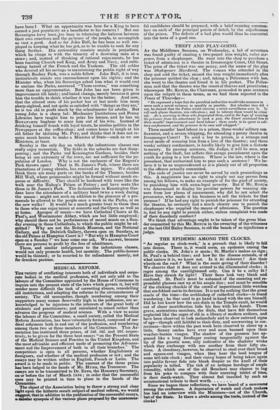THEFT AND PLAY-GOING.
AT the Middlesex Sessions, on Wednesday, a lad of seventeen was found guilty of stealing a two-pound iron weight, value six- pence, from a shopkeeper. He went into the shop to purchase a ticket of admission to a theatre in Ironmonger Court, Old Street. The price of the ticket was one penny, and the name of the play was Shakspeare Murdered. The woman who attended in the shop and sold the ticket, missed the iron weight immediately after the prisoner quitted the shop ; and, taking, a Policeman with her, she went to the theatre and found it in his pocket. The Polices man said that the theatre was the resort of thieves and prostitutes; whereupon Mr. ROTCH, the Chairman, proceeded to pass sentence upon the culprit in these terms, as we find them reported in the Times of Thursday- " He expressed a hope that the parochial authorities would take measures to . move such a moral nuisance as speedily as possible. But whether they did v not, he desired that the Police would exercise a strict surveillance over it. it call such places theatres, was ridiculous ; and to tolerate them would be crime. nal. As a warning to those who frequented them, and in the hope of weaning the prisoner from Ids attachment to such a pest, the Court sentenced him to three months' imprisonment and hard labour; three weeks to be spent in soli- tary confinement, and the prisoner to be once well whipped."
Three months' hard labour in a prison, three weeks solitary con. finement, and a severe whipping, for attending a penny theatre in Ironmonger Court! To send a boy to prison, is a strange and novel mode of weaning him from a love of the theatre; and three weeks' solitary confinement, is hardly likely to give him a distaste to society. In passing sentence, the Judge, it will be seen, says nothing of the theft, but inflicts this savage punishment upon the youth for going to a low theatre. Where is the law, where is the precedent, that authorized him to pass such a sentence? We be- lieve it to he as unprecedented as it is plainly out of all proportion to the offence actually committed.
The ends of justice can never be served by such proceedings as this. A magistrate has no right to single out any person from among his fellows, to make an example of for the good of society, by punishing him with extra-legal severity. But if Mr. ROTCH was determined to display his peculiar powers for weaning sin- ners from low places of amusement, why did he not select the prosecutor, who made it his business to sell the tickets for that purpose? If he had any right to punish the prisoner for attending the theatre, he certainly had a much clearer one to punish the shopkeeper who supplied the means of admission. The question is, had he any right to punish either, unless complaint was made of their disorderly conduct?
We think that advantage ought to be taken of the gross blun der committed by this Mr. BOTCH in the swearing of the witnesses at the last Old Bailey Sessions, to rid the bench of so injudicious. a judge.
























 Previous page
Previous page